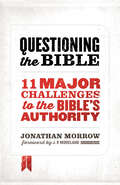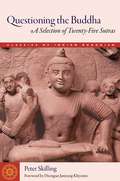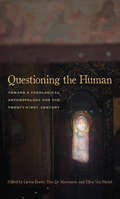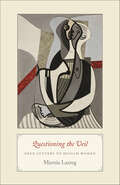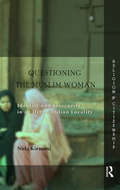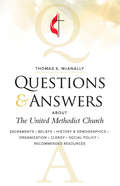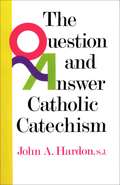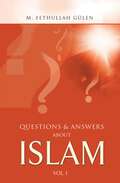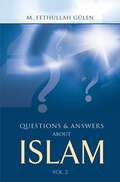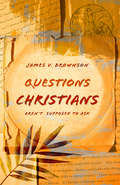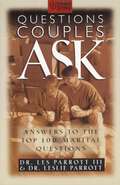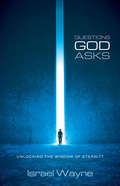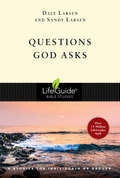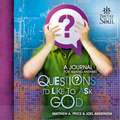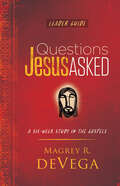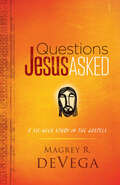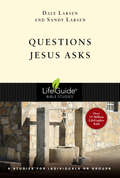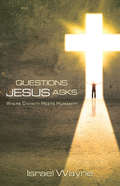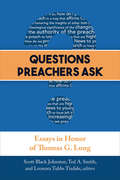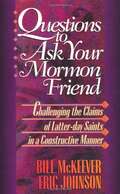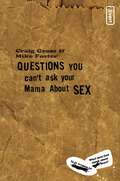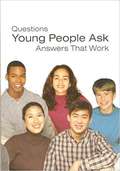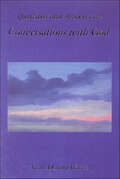- Table View
- List View
Questioning the Bible: 11 Major Challenges to the Bible's Authority
by Jonathan MorrowThe Bible is the most influential book in human history. But what are we supposed to do with it in the 21st century? And even more importantly, can it still be trusted as the Word of God?Confusion and doubt about the Bible are becoming as common inside the church as they are outside. Questions come from all sides:Is the Bible anti-intellectual?Has the biblical text been corrupted over the centuries?Who really chose the books of the Bible and why?Which interpretation of the Bible is correct?Are the gospels full of contradictions?There are an unprecedented number of sophisticated attacks on the origin, credibility, and reliability of the Bible today. Secularism has tried to undercut even the possibility of spiritual or moral knowledge. Skepticism toward institutional religion is at an all-time high.Yet, the Bible claims that truth is knowable and God is actively involved in our world.What are we to do?Pray for wisdom. Think clearly. Pick up your Bible. Read through the 11 major challenges presented in these pages. And be ready.
Questioning the Buddha: A Selection of Twenty-Five Sutras (Classics of Indian Buddhism)
by Peter SkillingAn important new book unlocking the words of the Buddha contained in the vast Tibetan canon, one of the main scriptural resources of Buddhism.In the forty-five years the Buddha spent traversing northern India, he shared his wisdom with everyone from beggar women to kings. Hundreds of his discourses, or sutras, were preserved by his followers, first orally and later in written form. Around thirteen hundred years after the Buddha&’s enlightenment, the sutras were translated into the Tibetan language, where they have been preserved ever since. To date, only a fraction of these have been made available in English. Questioning the Buddha brings the reader directly into the literary treasure of the Tibetan canon with thoroughly annotated translations of twenty-five different sutras. Often these texts, many translated here in full for the first time, begin with an encounter in which someone poses a question to the Buddha. Peter Skilling, an authority on early Buddhist epigraphy, archaeology, and textual traditions, has been immersed in the Buddhist scriptures of diverse traditions for nearly half a century. In this volume, he draws on his deep and extensive research to render these ancient teachings in a fresh and precise language. His introduction is a fascinating history of the Buddhist sutras, including the transition from oral to written form, the rise of Mahayana literature, the transmission to Tibet, the development of canons, and a look at some of the pioneers of sutra study in the West.
Questioning the Human: Toward a Theological Anthropology for the Twenty-First Century
by Lieven Boeve Yves De Maeseneer Ellen Van StichelTheological anthropology is being put to the test: in the face of contemporary developments in the spheres of culture, politics, and science, traditional perspectives on the human person are no longer adequate. Yet can theological anthropology move beyond its previously established categories and renew itself in relation to contemporary insights? The present collection of essays sets out to answer this question. Uniting Roman Catholic theologians from across the globe, it tackles from a theological perspective challenges related to the classical natural law tradition (part 1), to the modern conception of the subject (part 2), and to the postmodern awareness of diversity in a globalizing context (part 3). Its contributors share a fundamental methodological choice of a critical-constructive dialogue with contemporary culture, science, and philosophy.This collection integrates a wider range of approaches than one usually finds in theological volumes, bringing together experts in systematic theology and in theological ethics. Authors come from different American contexts, including Black and Latino, and from a European context that include both French and German. Moreover, the interdisciplinary insights upon which the different contributions draw stem from both the natural sciences (such as neuroscience, evolutionary biology, and ethology) and the humanities (such as cultural studies, philosophy, and hermeneutics).This volume will be essential reading for anyone seeking a state-of-the-art account of theological anthropology, of the uncertainties it is facing, and of the responses it is in the process of formulating. The shared Roman Catholic background of the authors of this collection makes this volume a helpful complement to recent publications that predominantly represent views from other theological traditions.
Questioning the Veil: Open Letters to Muslim Women
by Marnia LazregWhy Muslim women should not wear the veilAcross much of the world today, Muslim women of all ages are increasingly choosing to wear the veil. Is this trend a sign of rising piety or a way of asserting Muslim pride? And does the veil really provide women freedom from sexual harassment? Written in the form of letters addressing all those interested in this issue, Questioning the Veil examines the inconsistent and inadequate reasons given for the veil, and points to the dangers and limitations of this highly questionable cultural practice. Marnia Lazreg, a preeminent authority in Middle East women's studies, combines her own experiences growing up in a Muslim family in Algeria with interviews and the real-life stories of other Muslim women to produce this nuanced argument for doing away with the veil.Lazreg stresses that the veil is not included in the five pillars of Islam, asks whether piety sufficiently justifies veiling, explores the adverse psychological effects of the practice on the wearer and those around her, and pays special attention to the negative impact of veiling for young girls. Lazreg's provocative findings indicate that far from being spontaneous, the trend toward wearing the veil has been driven by an organized and growing campaign that includes literature, DVDs, YouTube videos, and courses designed by some Muslim men to teach women about their presumed rights under the veil.An incisive mix of the personal and political, supported by meticulous research, Questioning the Veil will compel all readers to reconsider their views of this controversial and sensitive topic.
Questioning the ‘Muslim Woman’: Identity and Insecurity in an Urban Indian Locality (Religion and Citizenship)
by Nida KirmaniThe marginalisation of Muslims in India has recently been the subject of heated public debate. In these discussions, however, Muslim women are often either overlooked or treated as a homogenous group with a common set of interests. Focusing on the narratives of women living in a predominantly Muslim colony in South Delhi, this book attempts to demonstrate the complexity of their lives and the multiple levels of insecurity they face. Unlike other studies on Indian Muslims that focus on Islam as a defining factor, this book highlights the ways in which religious identity intersects with other identities including class/status, regional affiliation and gender. The author also sheds light on the impact of such events as the Babri Masjid demolition in 1992 and the subsequent riots, the Gujarat communal carnage in 2002, and the anti-Sikh violence in New Delhi in 1984, along with the rise of Hindutva, and growing Islamophobia experienced worldwide in the post-9/11 period — on the articulation of identities at the local level and increasing religion-based spatial segregation in Indian cities. The study highlights how these incidents combine in different ways to increase the sense of marginalisation experienced by Muslims at the level of the locality. Understanding the need to look beyond preconceived religious categories, this book will serve as essential reading for those interested in sociology, anthropology, gender, religious and urban studies, as well as policymakers and organisations concerned with issues related to religious minorities in India.
Questions & Answers About The United Methodist Church, Revised
by Thomas S. McAnallyMcAnally has revised Questions & Answers About The United Methodist Church to update statistics and information throughout the book, along with new frequently asked questions not in the current edition.This book is a useful guide that answers the most frequently asked questions about the beliefs, practices, and history of The United Methodist Church. The information is brief, and is presented in an easy question-and-answer format. It is great for those new to The United Methodist Church or those who want to know more. Great give-away to new members or those interested in joining Gain a better understanding of The United Methodist Church Q&A format creates an easy reference for information and statistics about The United Methodist ChurchAlso available for the first time in Spanish with the title - Preguntas y respuestas sobre la Iglesia Metodista Unida.
Questions & Answers Catholic Catechism
by John HardonThe question and answer format is the most popular way of providing specific answers to specific quetions about Catholicism. Father John A. Hardon, using the material from his best-selling Catholic Catechism, has put together a book of over 1,700 questions and answers to provide the modern Catholic with easy access to the issues of the Catholic faith.The Question and Answer Catholic Catechism is divided into three parts:1. Christian Belief -- a study of the articles of faith as presented in the Apostles' Creed2. Living in the Christian Faith -- an examination of the Ten Commandments, the Beatitudes and the Commandments of the Church3. Sources of the Christian Life -- a consideration of grace, the Sacraments, prayer, the liturgyKeeping in mind that a good catechism must speak to the hearts of the faithful and answer their questions in clear, understandable language, The Question and Answer Catholic Catechism presents the modern Catholic with the essentials of the Catholic faith in a manner that is easy to use and spiritually sound.
Questions And Answers About Islam
by M. Fethullah GülenIn the past, unbelief was the outcome of ignorance. Then, when people learned about the truth, they were enlightened and found peace of mind. But recently unbelief, rejection, and denial have been the attitudes of those who consider themselves knowledgeable in all fields, who claim to accept and believe only on rational or scientific grounds. Cloaked in science and rational philosophy, the activity of unbelief continues in many forms. The quality of believers&’ submission is impaired, under constant threat and attack. In this book Fethullah Gulen, sensitive to the real questions people have the questions given rise to by the modern age has tried, through patient argument, to answer people&’s doubts and questions about faith.
Questions And Answers About Islam
by M. Fethullah GülenIslam, the most misunderstood religion in the world, is one of the hot topics to read about for many people. Questions and Answers about Islam Vol. 1 and 2 have been prepared to provide first-hand information from one of the leading Islamic scholars of our time. The first volume addresses the more essential questions concerning Islamic faith; e.g. God and the nature of His existence; can Islam solve every problem? Did Prophet Muhammad, peace and blessings be upon him, write the Qur&’an? Subjects like the Prophethood, Satan, etc. are also examined. The second volume delves deeper into a variety of subjects that will help those who are embarking on the exploration of Islam: wisdom in the message of the Qur&’an ethics and spirituality, the virtues of service in Islam, the anticipation of the Mahdi and Messiah, etc. Although the questions included in this second volume have been selected on the assumption that the reader is already acquainted with the contents of the first volume, an independent reading is still possible, for each question-answer is a separate entity and the book does not question from another.
Questions Christians Aren't Supposed to Ask
by James V. BrownsonWhy should anyone believe in God in a world with so much pain? How can I be part of the church when it&’s so full of hypocrisy? Isn&’t &“spiritual but not religious&” enough? What makes Jesus more important than Muhammad, Buddha, or other religious leaders? Why should I trust Christianity when it&’s hurt so many people? What if it hurt me? Most Christians have found themselves in conversations with nonbelieving friends and family where these kinds of questions have come up. In fact, most Christians have probably found themselves asking these questions too. But everyone who has ever wondered about such complicated things knows that this is dangerous territory—after all, what if there&’s no easy answer?This book welcomes and encourages these questions that Christians &“aren&’t supposed to ask.&” In each chapter, James Brownson introduces a particular question and then reframes it with a relevant passage from the Bible, bringing to bear his expertise as a biblical scholar. Rather than providing dogmatic (and ultimately unsatisfying) &“Sunday school answers,&” he explores the questions in provocative ways that often challenge the status quo of American Christianity. Fittingly, each chapter closes with discussion questions and suggestions for further reading, so that the conversations begun here can continue among the book&’s readers in fruitful ways.
Questions Couples Ask: Answers to the Top 100 Marital Questions
by Parrott LesFrom communication, conflict, and careers to sex, in-laws, and money. Questions Couples Ask is your first resource for help with the foremost hurdles of marriage. Drs. Les and Leslie Parrott share cutting-edge insights on the 100 top questions married couples ask. Whether you want to improve your own marriage or nurture the marriages of others, Christianity's premier husband-wife marriage counseling team equips you with expert advice for building a thriving relationship. How can I be honest without hurting my partner’s feelings? What do we do when one of us is a spender and one of us is a hoarder? What can we do to protect our marriage against extramarital affairs? How can we be more spiritually intimate as a married couple?
Questions God Asks
by Israel WayneUNDERSTANDING THE OMNIPOTENT GOD... WHO ASKS QUESTIONS OF US Why would God ask anyone a question? We ask questions when we don't understand. Yet, the Creator of the universe who spoke all that we see into being asks questions. Unimaginable power and wisdom are already His. As strange as it may seem to us, the Bible is filled with questions God asks. He is not the one who needs answers - these questions help us to understand both God and ourselves. Delve into the answers found by Job, Adam, Cain, Moses, Joshua, Elijah, and others Examine our fundamental assumptions about God, human nature, relationships, origins, and purpose Learn about godly character and God's transforming message Find a powerful supplement for family worship, Bible study, and personal devotions in the Questions God Asks. Stop demanding answers from God and begin answering the questions He asks of us.
Questions God Asks (Lifeguide Bible Study)
by Sandy Larsen Dale LarsenThis nine-session LifeGuide Bible study covers some of the surprising and interesting questions Old Testament characters heard from God, such as when he asked "Where are you?" of Adam and Eve. As we consider the questions God asked others, we are guided inward to reflect on the same questions in our own lives. For over three decades LifeGuide Bible Studies have provided solid biblical content and raised thought-provoking questions—making for a one-of-a-kind Bible study experience for individuals and groups. This series has more than 130 titles on Old and New Testament books, character studies, and topical studies.
Questions I'd Like to Ask God
by Joel Anderson Matthew PriceQuestions I'd Like to Ask God provides a forum enabling readers to challenge their beliefs by digging into Scripture and opening their hearts to God through prayer. This teen-savvy book addresses questions like, "What is God like?" and "Why am I here?" or "How can I know God's will for my life?" Journaling pages are included for readers to write down their thoughts, to note key verses that are meaningful, and to record answered prayers. Questions I'd Like to Ask God provides a road map to help readers begin a lifelong spiritual journey.
Questions Jesus Asked Leader Guide
by Magrey deVegaWhat does Jesus want to know about us?Jesus was fond of asking questions, many of which cut right to the heart of what it means to be human. Why are you terrified? What do you live for? Who do you say that I am? In Questions Jesus Asked, author Magrey deVega explores six of the most provocative questions Jesus posed to others and guides us in answering them for ourselves.Asking these questions takes courage. Not only do they reveal what Jesus really cares about, they open a window into our hearts. We all have questions for God, but growth happens when we turn things around and ask what Jesus wants to know about us. When we dare to raise them, these questions bring us a fuller appreciation for the wisdom, power, and presence of God in our lives. Are you willing to step out in faith? Are you ready to answer the questions Jesus asked?The Leader Guide contains everything needed to guide a group through the six-week study, including session plans, activities, discussion questions, and multiple format options. Additional components include the book, Questions Jesus Asked, and video teaching sessions featuring Magrey deVega, making this perfect as a group study throughout the year.
Questions Jesus Asked: A Six-Week Study in the Gospels
by Magrey deVegaWhat does Jesus want to know about us?Jesus was fond of asking questions, many of which cut right to the heart of what it means to be human. Why are you terrified? What do you live for? Who do you say that I am? In Questions Jesus Asked, author Magrey deVega explores six of the most provocative questions Jesus posed to others and guides us in answering them for ourselves.Asking these questions takes courage. Not only do they reveal what Jesus really cares about, they open a window into our hearts. We all have questions for God, but growth happens when we turn things around and ask what Jesus wants to know about us. When we dare to raise them, these questions bring us a fuller appreciation for the wisdom, power, and presence of God in our lives. Are you willing to step out in faith? Are you ready to answer the questions Jesus asked?The book can be read alone or used by small groups, and can be used anytime throughout the year. Additional components include video teaching sessions featuring Magrey deVega, and a comprehensive leader guide, making this perfect as a six-week group study done throughout the year.
Questions Jesus Asks (LifeGuide® Bible Studies)
by Dale Larsen"What do you want?" "Do you see this woman?" "Why do you call me, 'Lord, Lord,' and do not do what I say?" These are just some of the many questions that Jesus asked throughout the Gospels. Jesus invites us to inquire, reflect, and discuss. This nine-session Lifeguide is designed to help us dig into some of the questions that shape our view of Jesus and ourselves. For over three decades LifeGuide Bible Studies have provided solid biblical content and raised thought-provoking questions—making for a one-of-a-kind Bible study experience for individuals and groups. This series has more than 130 titles on Old and New Testament books, character studies, and topical studies. Rooted in a year-long discussion held by Biola University's Center for Christian Thought (CCT), this volume bridges the gaps caused by professional specialization among psychology, theology, and philosophy. Each essay was forged out of an integrative discussion among theologians, psychologists, philosophers, New Testament scholars, educators, and pastors around the CCT seminar table. Topics that emerged included relational and developmental spirituality, moral virtue and judgment, and suffering and trauma. Psychology and Spiritual Formation in Dialogue speaks across disciplinary divides, fostering fruitful conversation for fresh insights into the nature and dynamics of personal spiritual change. Contributors include Justin L. Barrett, School of Psychology, Fuller Theological Seminary Earl D. Bland, Rosemead School of Psychology, Biola University Ellen T. Charry, Princeton Seminary John H. Coe, Biola University Robert A. Emmons, University of California, Davis Stephen Evans, Baylor University Bruce Hindmarsh, Regent College, Vancouver Marie T. Hoffman, New York University James M. Houston, Regent College, Vancouver Steven J. Sandage, David R. Paine, and Jonathan Morgan, Boston University Siang Yang Tan, School of Psychology, Fuller Theological Seminary Everett L. Worthington, Jr., Brandon J. Griffin, and Caroline R. Lavelock, Virginia Commonwealth University Edited by Thomas M. Crisp, professor of philosophy, Biola University Steve L. Porter, professor of theology, spiritual formation, and philosophy, Talbot School of Theology and Rosemead School of Psychology, Biola University Gregg Ten Elshof, professor of philosophy, Biola University
Questions Jesus Asks: Where Divinity Meets Humanity
by Israel WayneJesus rarely answered questions He was asked, but instead turned the tables by asking a piercing question of His own. Questions Jesus Asks goes through a broad spectrum of these, dealing with issues like morality, suffering, humility, faith, and much more. Explore the unique paradox of Jesus' divinity and humanity Be challenged by the questions Jesus asks each of us Learn more about Jesus and find the answers to your own life's questions. John 17:3 tells us: "And this is eternal life, that they know you the only true God, and Jesus Christ whom you have sent." There is no higher purpose in life than the knowledge of God through His Son. Prepare to learn far more about God and the nature of Jesus than you thought was possible. Jesus asks penetrating questions that cut passed the pretense and reach the target of our hearts.
Questions Preachers Ask: Essays In Honor Of Thomas G. Long
by Scott Black Johnston Ted A. Smith Leonora Tubbs Tisdale"How do we preach in a way that affirms Christian theology while also honoring the insights of other faith traditions?" "How do we preach about and help create genuine Christian community in a social networking culture?" <P><P>Questions Preachers Ask examines many questions that are on the minds of preachers today, questions that focus on how to preach the gospel in a culture where biblical knowledge cannot be presumed and where the Bible is often viewed as untrustworthy. Well-known preachers, scholars, and authors, including Barbara Brown Taylor, Gail O'Day, Anna Carter Florence, Richard Lischer, and Thomas Lynch, provide the answers. <P><P>This book, compiled to honor writer, preacher, teacher, and scholar Thomas G. Long at the end of his teaching career, addresses practical questions such as "How do we proclaim the good news to young adults who are on the margins of church or have left it?" and "How do we preach to faith communities that are highly diverse?" Perfect for preachers at any stage of their ministry, these essays offer hope and guidance for handling the difficult task of preaching in today's congregations.
Questions To Ask Your Mormon Friend: Effective Ways To Challenge A Mormon's Arguments Without
by E. Johnson Bill McKeeverFifteen Effective Questions to Help a Mormon Seriously Examine His Faith In 1853 the Mormon Apostle Orson Pratt issued the challenge: " - convince us of our errors of doctrine, if we have any, by reason, by logical arguments, or by the word of God, and we will be ever grateful for the information." Many Christians have stated that they would challenge Mormon acquaintances about their theology if they knew what to say. From their in-depth research of Mormonism, Bill McKeever and Eric Johnson have compiled fifteen questions that Christians can ask latter-day Saints to help them seriously examine their faith. In a user-friendly manner, it provides simple, straightforward arguments that lay-Christians can easily access. Also included is a dictionary of the Mormon language. This helps the reader better understand Mormon terminology and shows how it is different from similar words used by Christians.
Questions You Can't Ask Your Mama About Sex (Invert Ser.)
by Craig GrossNot the birds and the bee’s, guys’ plumbing vs. girls’ plumbing, how-it-all-works talk. Let’s talk about sexuality; your sexuality and the sexuality of others. Let’s talk about what is and isn’t okay to look at, do, and think about. Questions You Can’t Ask Your Mama About Sex is exactly that—questions too uncomfortable to talk about with your parents. This collection of discussions is drawn from real questions asked of the folks at XXXchurch.com. No topic is off limits—masturbation, pre-marital sex, technical virginity, pornography, homosexuality, sex toys, sex addiction. Not for the squeamish, these issues focus on the culture and commerce of sex to tell you what God has to say about keeping your clothes on. If you have questions about “doin’ it” that are burning a hole in the back of your head (or somewhere else on your body), look no further than this book.
Questions Young People Ask, Answers That Work: Volume 1
by Watch Tower Bible Tract Society of PennsylvaniaThis book explores many of the problems that face teenagers and their respective families today. It is documented with excerpts from psychologists and more importantly shows the practicality of following the instructions given by the Creator of mankind himself. It is not as restrictive as many would have us believe.
Questions Young People Ask, Answers That Work: Volume 1 (2nd Edition)
by Watch Tower Bible Tract Society of New York Inc.The sections of this book enable adolescents and parents alike to face and work through some of the most challenging problems that confront people in our changing times. It is filled with planners to help us face situations and circumstances that could otherwise be debilitating. True to life examples and the outcome derived from applying this information are truly helpful to teens and to parents and custodians alike.
Questions Young People Ask, Answers That Work: Volume II
by Watch Tower Bible Tract Society of PennsylvaniaTo young people going through adolescence can be like walking a tightrope. Each step may seem unsure--even frightening. Parents would like to spare their youth from this dilemma, but it is impossible. This book has been designed for both parents and youths to make it through this rough period in life and emerge as responsible individuals. The book covers the most important areas of life, some areas and questions are covered that youths may feel uneasy discussing with others. Each chapter provides a "role model", an action plan and suggested tips to make these life choices easier. Although there is no adult content in the book, subjects that are discussed here are open, frank and not for preteens.
Questions and Answers on Conversations with God
by Neale WalschMillions of readers have come to value the Conversations with God series by Neale Donald Walsch, which has now been translated into twenty-six languages. Many thousands of those readers have had questions for him--questions about religion, good and evil, physical and mental health, death, prophecy, the nature of God and the universe, prayer, angels and devils, spiritual paths, relationships, and much more.In Questions and Answers on Conversations with God, Neale, with characteristic wit and wisdom, responds to the most compelling and provocative of these letters; and the result is a book that is profoundly enlightening and inspiring. By relating the messages in the dialogues of CWG to the personal issues and everyday experience of individuals, Neale's answers illustrate the direct link between spiritual and physical reality, clearly demonstrating how what we do and who we are in our lives is a result of how we think and what we believe.This book gives us all the opportunity to look at ourselves, to change ourselves, and thus, perhaps, to change the world.
